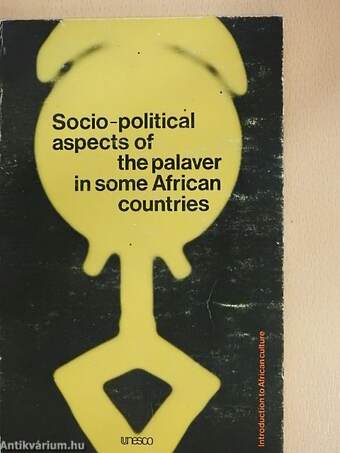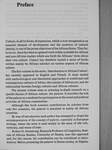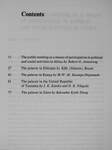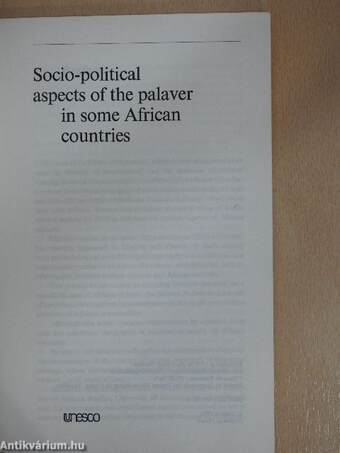1.117.562
kiadvánnyal nyújtjuk Magyarország legnagyobb antikvár könyv-kínálatát
Socio-political aspects of the palaver in some African countries
| Kiadó: | United Nations |
|---|---|
| Kiadás helye: | Paris |
| Kiadás éve: | |
| Kötés típusa: | Ragasztott papírkötés |
| Oldalszám: | 93 oldal |
| Sorozatcím: | Introduction to African culture |
| Kötetszám: | |
| Nyelv: | Angol |
| Méret: | 21 cm x 14 cm |
| ISBN: | 92-3-101641-5 |
naponta értesítjük a beérkező friss
kiadványokról
naponta értesítjük a beérkező friss
kiadványokról
Fülszöveg
Preface
Culture, in all its forms of expression, which is now recognized as an essential element of development and the assertion of cultural identity, is one of the prime objectives of the African States. Thus far, however, there has been no general work widely available for African and non-African readers which sets forth the Africans' views about their own culture. Unesco has therefore started a series of books written mainly by African scholars on various aspects of African culture.
The first volume in the series, 'Introduction to African Culture', has recently appeared in English and French. It deals mainly with methodological and theoretical approaches to traditional and contemporary cultures of Africa, the concept of African art, and the relationship between foreign cultures and African cultures.
The present volume aims at orienting in-depth research on a specific feature of African culture: the palaver. It describes the role of the palaver as a medium for participation... Tovább
Fülszöveg
Preface
Culture, in all its forms of expression, which is now recognized as an essential element of development and the assertion of cultural identity, is one of the prime objectives of the African States. Thus far, however, there has been no general work widely available for African and non-African readers which sets forth the Africans' views about their own culture. Unesco has therefore started a series of books written mainly by African scholars on various aspects of African culture.
The first volume in the series, 'Introduction to African Culture', has recently appeared in English and French. It deals mainly with methodological and theoretical approaches to traditional and contemporary cultures of Africa, the concept of African art, and the relationship between foreign cultures and African cultures.
The present volume aims at orienting in-depth research on a specific feature of African culture: the palaver. It describes the role of the palaver as a medium for participation in the social and political activities of African communities.
Although this book contains contributions by scholars from only five countries, the palaver is practised in nearly all African countries.
By way of introduction each author has attempted to dispel the misinterpretation of the concept of palaver, especially in European writings, where the term is used mainly in the sense of idle talk, verbosity, and waste of time.
Robert G. Armstrong, Research Professor of Linguistics, Institute of African Studies, University of Ibadan, uses this approach and, for this reason, his contribution can be considered as introductory. Before presenting the palaver in Idoma society, in Nigeria, Vissza
Témakörök
- Történelem > Társadalomelmélet
- Szociológia > Politikai szociológia
- Idegennyelv > Idegennyelvű könyvek > Angol > Szociológia > Politikai szociológia
- Idegennyelv > Idegennyelvű könyvek > Angol > Történelem > Egyéb
- Szociológia > Tanulmányok, esszék
- Idegennyelv > Idegennyelvű könyvek > Angol > Szociológia > Tanulmányok, esszék
- Történelem > Idegennyelvű > Angol
- Történelem > Kontinensek szerint > Afrika, afrikai országok története
- Történelem > Legújabb kor > A hidegháború kora (1946-1991)
- Történelem > Politika > Politológia
- Történelem > Tanulmányok










